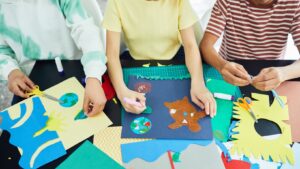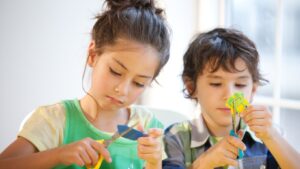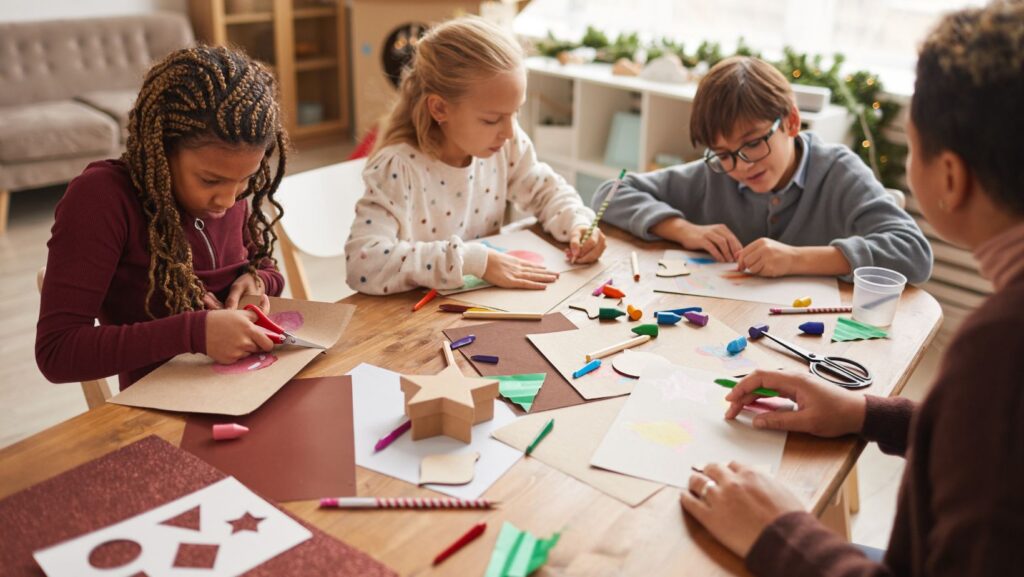In the bustling world of preschoolers, family and friends form the cornerstone of their little universe. This article delves into a treasure trove of activities that can help preschoolers learn, appreciate, and celebrate these vital relationships.
From crafting family trees to hosting mini-friendship days, these activities aren’t just fun-filled, they’re also packed with learning opportunities. They’ll help children understand the concept of family, friendship, and the joy of togetherness. So, let’s embark on this exciting journey of exploration and discovery, fostering stronger bonds and creating lasting memories.
Preschool Activities About Family And Friends
Fostering Social Development
 Actively encouraging social development in preschoolers serves as an essential element in their growth. These interactions help them develop communication skills, learn how to express feelings, and interact respectfully with others. Activities like collaborative art projects, role-playing games, and music circles act as perfect avenues.
Actively encouraging social development in preschoolers serves as an essential element in their growth. These interactions help them develop communication skills, learn how to express feelings, and interact respectfully with others. Activities like collaborative art projects, role-playing games, and music circles act as perfect avenues.
For instance, a collaborative art project, such as a giant piece of mural art of a family or a group of friends, lets children contribute their unique ideas, promoting teamwork and mutual respect. Similarly, role-playing games emphasizing friendship roles and responsibilities, like “Best Friend’s Day,” provides an engaging platform. They learn gratitude, empathy, and the importance of support, reflecting real-world social dynamics. Lastly, music circles using songs about family love and friendship foster camaraderie and a sense of belonging, vital aspects of social settings.
Understanding Family Dynamics
Another crucial area prescholars grasp through targeted activities includes the analysis of family dynamics. It helps them appreciate differences, resolve conflicts amicably, and cherish the bonds they have with their loved ones. Creating a family tree, mini home-activities, and themed story sessions can prove highly instrumental in this regard.
A family tree provides an authentic representation of their lineage, reminding them of where they come from, and the importance of each member. Following it, partake children in mini home-activities like cooking a family recipe or gardening. It not only brings them closer to the family tradition but also imparts valuable lifelong skills. Themed story sessions around “Family Day” can further solidify this understanding. Children can comprehend concepts like compromise, sacrifice, and the unconditional love of a family from these tales that resonate with their life experiences.
Taken together, these preschool activities about family and friends provide solid education while ensuring wholesome enjoyment for the little ones.
Fun and Educational Activities to Explore the Concept of Family
In line with the goal to provide comprehensive development for preschoolers, additional activities can further enhance their understanding of family dynamics. These activities merge both fun and learning, elaborating on familial concepts and relationships.
Creating a Family Tree
An intuitive approach involves creating a family tree. This hands-on activity provokes thought patterns, educates the child about their lineage and, at the same time, commits to building a personal connection. To execute this, educators supply each individual with a pre-printed tree and photographs of family members. A child, under supervised guidance, learns to categorize these pictures as per the relationship’s hierarchy. For example, Parents, Grandparents, and Siblings are placed on different branches. A family tree, thus, unravels the child’s roots, instills respect for elders, and elucidates the notion of ancestry.
Role-Playing Different Family Members
 Another engaging avenue to delve into family dynamics is through role-playing. It simultaneously supports the child’s creativity and social skills. The educator enacts a particular family member’s characteristics and behavior. The rest of the group, in turn, guesses the role being played, imitates it, and discusses its responsibilities. Suppose one role-plays a ‘Mother’. In this scenario, children might identify cooking, comforting, or discipline as key attributes.
Another engaging avenue to delve into family dynamics is through role-playing. It simultaneously supports the child’s creativity and social skills. The educator enacts a particular family member’s characteristics and behavior. The rest of the group, in turn, guesses the role being played, imitates it, and discusses its responsibilities. Suppose one role-plays a ‘Mother’. In this scenario, children might identify cooking, comforting, or discipline as key attributes.
Following this, a conversation ensues discussing a mother’s role and the importance of her duties. Through this activity, students realize the roles and responsibilities of each family member, encouraging empathy, respect, and understanding with engaging playfulness.
Circle Time Discussions
Circle time discussions stand as another effective method of fostering friendships. These discussion sessions revolve around topic themes such as trust, sharing, respect, kindness – traits essential for a friend. For instance, teachers pose questions like, “What does it mean to be a good friend?” Diverse responses spring forth from the children’s perspectives, allowing them to learn from one another. Active participation enhances their listening and communication skills, providing a robust platform for friendship cultivation. Furthermore, circle time discussions help in promoting socio-emotional growth among children, giving them a clearer understanding of what friendships mean, thereby harmonizing relations within the learning environment.

